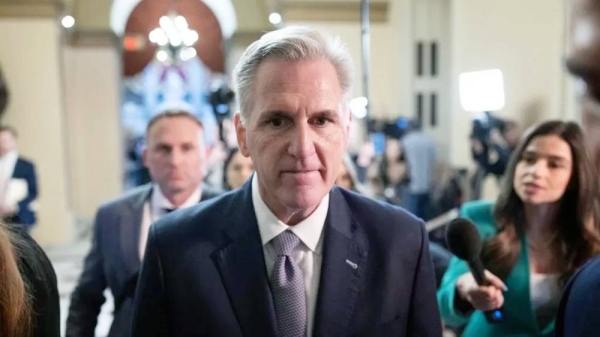
The leaderless House was plunged deeper into chaos on Thursday after Republicans refused to coalesce around a speaker and a plan to empower an interim speaker collapsed.
Angry and exhausted, the House Republican conference left a pair of tense closed-door sessions no closer to breaking the impasse that has immobilized the House for a 17th day. The party’s embattled nominee for speaker, congressman Jim Jordan, the Donald Trump loyalist who led the congressional effort to overturn the 2020 presidential election and now chairs the House judiciary committee, had vowed to press ahead with his bid to ascend to the post.
After losing two consecutive votes to secure the speakership, Jordan had reversed course and backed a novel, bipartisan proposal to expand the authority of the temporary speaker for the next several months as he worked to shore up support for his bid. But a group of hard-right conservatives revolted, calling the plan “asinine” and arguing that it would effectively cede control of the floor to Democrats.
As support for the idea crumbled, Jordan told reporters that he would continue to press ahead with his candidacy despite entrenched opposition from a widening group of members, some of whom accused the Ohio Republican of deploying intimidation tactics.
“We made the pitch to members on the resolution as a way to lower the temperature and get back to work,” Jordan told reporters on Thursday. “We decided that wasn’t where we’re gonna go. I’m still running for speaker and I plan to go the floor and get the votes and win this race.”
Jordan offered no timeline and no votes were scheduled as of Thursday afternoon. Behind closed doors, tensions boiled over. Kevin McCarthy, the ousted former speaker, clashed with Florida congressman Matt Gaetz, who led the push to remove him earlier this month.
“The whole country I think would scream at Matt Gaetz right now,” McCarthy said.
“Temperatures are pretty high,” congressman Mike Gallagher, a Wisconsin Republican, told reporters as he left a conference meeting on Thursday. He said he was headed to the chapel to pray for some “divine guidance”.
The dramatic saga to elect a new speaker began earlier this month with the unprecedented ousting of McCarthy, a move backed by eight far-right Republicans and all Democrats.
In a secret ballot, the Republican conference initially nominated congressman Steve Scalise to replace McCarthy, choosing the No 2 House Republican over Jordan, a founding member of the ultra-conservative Freedom Caucus. But Scalise abruptly withdrew when Jordan’s far-right allies refused to coalesce around him.
Jordan, the runner-up, then emerged as the party’s second choice to be speaker. But his candidacy ran headlong into opposition from more mainstream members wary of elevating a political flamethrower and Trump loyalist to a position that is second in line to the presidency. Wars raging in Ukraine and Israel and a government funding deadline looming had Republicans desperate to move forward.
With the majority party deadlocked, a bipartisan group of lawmakers began to explore the possibility of expanding the powers of the acting speaker, the Republican congressman Patrick McHenry of North Carolina, thereby allowing the chamber to take up urgent legislation.
McHenry assumed the position of speaker pro tempore under a House rule put in place after the September 11 terrorist attacks. It requires a speaker to draw up a confidential list of lawmakers who would temporarily assume the job in the event the speaker’s chair should become vacant. When McCarthy was ousted, the House learned that McHenry, a close ally of the former speaker, was at the top of that list.
McHenry has waived off calls to expand his power, indicating that he views the role as limited to presiding over the election of the next speaker. But McCarthy told reporters on Thursday that he believes McHenry already has the authority to conduct legislative business.
“It’s about the continuity of government,” McCarthy said. “I always believed the names I was putting on the list could carry out and keep government running until you elect a new speaker.”
But several conservatives decried the effort to install a temporary speaker, preferring Jordan plow ahead with more votes. After all, they argue, it took McCarthy 15 ballots to be elected speaker in January.
“I believe it is a constitutional desecration to not elect a speaker of the House,” Gaetz, the Florida Republican, told reporters.“We need to stay here until we elect a speaker.”
The cast of rebels who oppose Jordan are a mix of political moderates and institutional pragmatists with deep reservations about the Ohio Republican’s approach to governance. Some hail from districts that Joe Biden won in 2020, where Jordan’s brand of far-right conservatism is unpopular. Several were wary of handing the gavel to a lawmaker the former Republican speaker John Boehner once called a “legislative terrorist”.
One conservative lawmaker, Colorado congressman Ken Buck, who was among the hard-right faction that voted to oust McCarthy, said he would not support Jordan because Jordan still refused to accept Biden’s victory in the 2020 presidential election.
In a frenetic effort to win over his opponents, Jordan’s allies on Capitol Hill and in conservative media waged an aggressive pressure campaign that some lawmakers said included harassing messages and threats of a primary challenge. The calculation was that Jordan’s more mainstream critics would eventually relent and fall in line behind him. But his hardball tactics backfired, those lawmakers said.
“One thing I cannot stomach or support is a bully,” said congresswoman Mariannette Miller-Meeks, an Iowa Republican, who initially voted for Jordan and then opposed on a second ballot after she said in a statement that she had received “credible death threats and a barrage of threatening calls”.
It was a sudden role reversal for Jordan, who is far more accustomed to being an obstructor than being obstructed. Yet on Thursday he attempted a reset, huddling once again with a group of holdouts, some of whom have vowed to block him from ever claiming the gavel.
But progress eluded Jordan. After the meeting, congressman Mike Lawler, a New York Republican opposed to Jordan, called for the conference to reinstate McCarthy or empower McHenry.
“We must prove to the American people that we can govern effectively and responsibly or, in 15 months, we’ll be debating who the minority leader is and preparing for Joe Biden’s second inaugural,” he said.
Twenty-two Republicans and all Democrats opposed Jordan on Wednesday, up from 20 Republicans who voted against him on the first ballot. To claim the gavel in the narrowly divided House, Jordan would need support from nearly every member of his conference.
Democrats, who view Jordan’s involvement in Trump’s efforts to overturn the election that resulted in the January 6 attack on the US Capitol as disqualifying, unanimously backed their leader, Hakeem Jeffries of New York. Democrats, however, have expressed a willingness to negotiate with Republicans to elect a consensus candidate for speaker or empower a placeholder speaker.
“I think it’s a triumph for democracy in our country that an insurrectionist was rejected by the Republicans again as their candidate for speaker,” the former House speaker Nancy Pelosi said on Wednesday.












